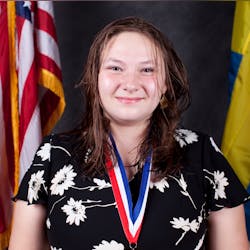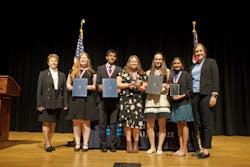NJ high school student wins 2019 U.S. Stockholm Junior Water Prize
ALEXANDRIA, VA, JUNE 19, 2019 -- The Water Environment Federation (WEF) has named Sonja Michaluk winner of the 2019 U.S. Stockholm Junior Water Prize (SJWP), the nation's most prestigious youth competition for water-related research.
Michaluk, a student at Hopewell Valley Central High School in Pennington, N.J., explored the use of DNA barcoding to measure the health of waterways with larval Chironomidae (order Diptera), the most widespread macroinvertebrate family. She won $10,000 and an all-expenses paid trip to Stockholm to represent the United States at the international competition in late August.
Students from 45 states and Puerto Rico competed in the national finals June 13-16 at the Ohio State University in Columbus, Ohio. The Stockholm Junior Water Prize aims to increase students' interest in water issues, research, and careers, as well as to raise awareness about global water challenges. The competition is open to projects focused on improving water quality, water resource management, water protection, and drinking water and wastewater treatment.
"The health and future of our global water environment depends on the kind of ingenuity and innovation the Stockholm Junior Water Prize competition showcases," said WEF Executive Director Eileen O'Neill. "WEF takes pride in supporting these young scientists as they work to solve some of the most complex challenges facing the water sector."
Michaluk's winning project, "A Novel Method of Monitoring the Health of our Global Fresh Water Supply using DNA Barcoding of Chironomidae (Diptera)," emphasized a forecast that 66 percent of the U.S. population will experience water scarcity within a decade, leaving residents more dependent on surface water for drinking. Current surface water monitoring methods rely on expensive and technically challenging manual identification of biological samples. DNA barcoding, Michaluk noted, "results in more accurate and precise waterway health data, adding significant value for monitoring scarce water resources."
The judges commented: "Beyond the very impressive research Sonja performed in her study of Chironomidae DNA barcoding to determine water quality health, she also applied her knowledge to a local non-profit water institute to improve her own community watershed. These students are creating solutions to improve communities across the world, and the Stockholm Junior Water Prize is a testament to the importance of investing in the future of our industry. The diversity of students and ideas this year demonstrated solutions for our world's water challenges will come from young people of all backgrounds."
In the U.S., WEF and its Member Associations organize the regional, state, and national competitions with support from Xylem Inc., who also sponsors the international competition. To learn more, visit www.wef.org.

